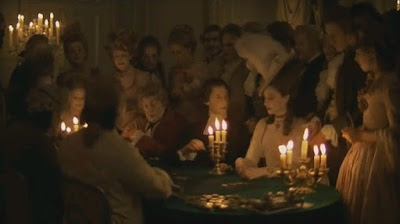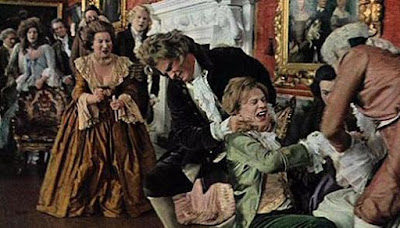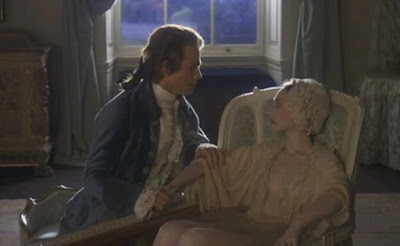 |
The tableau of human existence often resembles a large
chessboard. All of us, who are engaged in a game of survival, are pawn pieces
that can be eliminated due to the slightest lapse of judgment. In such a brutal
battleground, we often have to submit to the most unexpected circumstances and then
perish amidst the complex web of causes and effects. Yet, how often can we
understand the secrets behind all these human experience? Is it possible that
we are controlled by a sort of driving force, that we are inaccessible to and are
often beyond our control? After all, can we detach ourselves from the
subjective feelings that have always entrapped us and achieve a higher level of
understanding regarding our humanistic existence? If you are fascinated by the
above questions, then the film I am discussing at length in the coming weeks is
the one for you – Stanley Kubrick’s Barry Lyndon (1975) !
‘Barry Lyndon’, a 18th century period drama, was
one of Kubrick’s major efforts at the 1970s. The script was based on W. M. Thackeray’s
novel ‘The luck of Barry Lyndon’, though the perspective and the plot elements
were very different in Kubrick's version, giving the film a unique charisma of
its own. ‘Barry Lyndon’ is important because it is a surrogate for Kubrick’s
abandoned project, ‘Napoleon’. All the efforts and preparations for ‘Napoleon’
would be fully realized in ‘Barry Lyndon’, from an insistence on natural light
photography to the authenticity for the details in terms of plot, set design
and costume. Given the available materials that have been passed on to the later
generations, one can appreciate that ‘Napoleon’ would likely to be Kubrick’s
most ambitious project, and this could also be felt when one was viewing the
abandoned project’s cousin, ‘Barry Lyndon’.
At an epic length of 3 hours, the 1975 film chronicled the
rise and fall of a social climber, Barry Lyndon (starring Ryan O’Neal), and the
story also shed lights on many issues regarding human existence. Like many
other Kubrick films, ‘Barry Lyndon’ received mixed reviews upon its initial
release, and performed poorly at the box office. The film still managed to
receive 4 Oscars, and Kubrick was nominated for Best Picture, Director and
Adapted Screenplay. Nevertheless, ‘Barry Lyndon’ has stood the test of time,
and more people have become aware of the film over the years, and now it is
considered as one of Kubrick’s towering achievement.
Let me be frank – I am certainly not a ‘special species’ who has a stunning endurance for apparently ‘boring’ materials. When I first watched ‘Barry Lyndon’ in my teenage years, like many viewers, I felt the film to be extremely slow and boring. Yet, the film has certainly left an intense impression on me, and many of the filmic images in the film have lingered long in my mind since my first viewing of the film. I believe my first impression in ‘Barry Lyndon’ was caused by a thirst for sensation or sentiment in my early years of watching films, and ‘Barry Lyndon’ seemed to offer the viewers neither of these ‘emotional pornography’. When I have grown up, I have been able to realize the futility of fake sentiment and have started to think deeper into the many issues regarding human nature. Thus, I decided to give this boring film another chance. This time, it was a completely different experience, and the numerous insightful observations ‘Barry Lyndon’ has offered represented great inspirations for me to probe into the questions regarding the human condition. Now, ‘Barry Lyndon’ has an extremely special place in my heart. It is one of the only three films that have significantly influenced my worldview, the way I look at the world. The other 2 contenders are iconic in their own ways, too – Akira Kurosawa’s ‘Rashomon’ and Kubrick’s ‘2001: A Space Odyssey’.
 |
I have the strong commitment that, as a faithful follower of
Stanley Kubrick, I have to recommend ‘Barry Lyndon’ to you, for both practical
and personal reasons. The major reasons are because the film is far less known
when it is compared to the other late Kubrick films, and more important, it is
an intensely misunderstood film. The two issues seem to intertwine in a curious
way. The reason why ‘Barry Lyndon’ is a lesser known Kubrick film is likely
because the audience are misled to believe that the film is ‘cold’, ‘boring’,
‘clinical’, and ‘slow’ – some of the labels splattered by certain ‘critics’, for
whom I doubt whether they have the patience to finish off the whole film and
then make a fair comment. The comments from these ‘walk-out-at-20-minutes’
personalities are abundant on the web, and I suppose the wrong message have
been passed on as a result.
Which, I think, is rather paradoxical. ‘Barry Lyndon’ is a very
subtle film, because the film does not have heightened characters like those in
‘2001’, ‘A Clockwork Orange’ or ‘The Shining’. That suggests the film does not
have a Wow factor that makes one jump out of the seat. Indeed, the characters
we find in ‘Barry Lyndon’ are normal people, who are desperate for survival in
a hostile world. Many of these characters are dark, hypocritical and negative,
yet they are very realistic – they are the archetypes who are timeless and can
be easily identified in our world. Many audiences can be able to identify with
the protagonist, Barry, and it should not be surprising that our world is full
of Barry Lyndons – social climber, opportunist, amoralist. On the other hand,
‘Barry Lyndon’ has some of the most compassionate and emotional moments in any
Kubrick films, and I believe those detractors have likely left the cinema at
those moments, so they are oblivious to those scenes. That is why I think it is
rather strange, because ‘Barry Lyndon’ is a Kubrick film which is most relevant
to the human experience, and I suppose any audience who are inquisitive about
humanity should be interested in such a film. To me, ‘Barry Lyndon’ is possibly
the most Kubrickian film of all – it is in the film when Kubrick expresses his
insightful views about humanity and showcases his unique approaches to film
art. The secret to appreciate ‘Barry Lyndon’ is patience and an open mind.
‘Barry Lyndon’ is a film that rewards multiple viewings, because one viewing is
simply not enough to take in all the stunning filmic images and themes. If you
have the patience to engage with Kubrick’s stunning period piece, you will find
‘Barry Lyndon’ a calm and unsentimental film, yet ripen with witty black humor,
surprising and awe-inspiring twists, rich human insights and genuine emotions.
 |
A brief sketch on the story. The plot follows a two part
structure, detailing the rise and fall of a layman in the 18th century, known as Redmond Barry (Ryan
O’Neal). An omniscient narrator is also present to provide observations and
some of the dark and cynical humor. From a humble beginning, Barry longed to
have a social status and a true love. Barry was just a chess piece on the
enormous chessboard of humanity. After killing an opponent in a duel for
passion, Barry was forced into exile, only to learn later that, his opponent
faked his death so that the girl’s family could chase Barry away from town, and
she could marry Barry’s opponent, who was richer and would lead to a better
economic prospect. Circumstances and the Seven Years’ War drove Barry into
different fronts, and his solace was a warm-hearted family friend, Captain Grogan.
Yet when Grogan was killed in a skirmish in the most circumstantial way, Barry
realized that he had to be ruthless and took any chances he encountered, if he still
wanted to stay in the game and prospered in such a hopeless universe.
Eventually, luck knocked on Barry’s door, when Barry courted and eventually
married Sir Charles Lyndon’s wife, Lady Harriet Lyndon -of course, after Sir
Charles died untimely from a heart attack.
Barry became Barry Lyndon, like some sort of a double existence. But his
dark side eventually caught up with his bright future, when he estranged the
timid Lady Lyndon, amassed financial problems and ignited the wrath of his
stepson, Lord Bullingdon. Would fate spare Barry Lyndon, and would Barry lead
to a happy end and actualize his life? Wait a minute, didn’t the narrator tell
us the answer halfway through the film ...?!
For the time being, if
you are interested in Stanley Kubrick and yet have not watched ‘Barry Lyndon’
before, just give it a shot!
by Ed Law
10/9/2016
Film Analysis - 69





